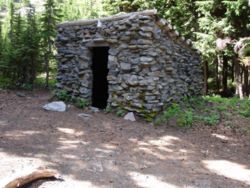Cairn Basin via Mazama Trail Hike
From Oregon Hikers Field Guide
- Start point: Mazama Trailhead
- End point: Cairn Basin
- Trail Log: Trail Log
- Hike Type: In and out
- Distance: 8.8 miles round-trip
- Elevation gain: 2465 feet
- High Point: 5,745 feet
- Difficulty: Moderate
- Seasons: July - November
- Family Friendly: Yes, for older kids
- Backpackable: Yes - follows the Timberline Trail
- Crowded: Summer weekends
Contents |
Description
The Mazama Trail #625 is a less popular ridge crest connector to various destinations on the north side of Mount Hood: McNeil Point, Cairn Basin, Eden Park, Wy'East Basin, Dollar Lake, and Barrett Spur are all possible using this trail. The trail essentially formed the western boundary of 2011’s extensive Dollar Lake Fire.
The trail begins among young conifers, including subalpine fir, Douglas-fir, silver fir, and mountain hemlock, with an understory of chinquapin and rhododendron. After signing in at the Wilderness Permit box, you switchback up through an older clearcut and reach a former road bed. A large pool below the trail is fed by a nearby spring. The trail passes a second spring and reaches a talus slope below a rock outcropping. You make three switchbacks up the talus slope, the north edge of which was reached by the 2011 Dollar Lake Fire. There are views down into the Ladd Creek valley.
The trail enters the woods and traverses up to the ridge crest before entering old growth montane forest with a rhododendron understory. There are 14 switchbacks up in these cool, green woods; at the eighth switchback, you will reach the edge of the Dollar Lake Burn. Higher up, near the Mt. Hood Wilderness sign, the fire actually crossed the trail for a few yards. The trail levels and exits the burn then rises gradually among a dense understory of huckleberry bushes. There are several more switchbacks before the tread reaches the edge of the ridge and enters the fire zone a second time. The path winds up, giving good views across to Vista Ridge and a waterfall on Ladd Creek. In early summer, blooming avalanche lilies carpet this section of the burned forest.
The trail makes a couple of switchbacks and continues up the ridge before emerging onto a mountain hemlock parkland thickly cloaked with heather and bear-grass. Mount Hood looms ahead. The Mazama Trail drops back into shady woods, traverses up, and reaches a talus-filled gully where pikas squeak their alarm calls. A few tongues of the fire reached this area but did not cross the trail. There’s a small tarn, a bubbling stream, and a campsite before you reach the Timberline-Mazama Trail Junction.
Turn left here and proceed east. You will pass the “shortcut” to the McNeil Point Loop where a sign admonishes hikers not to venture as meadows restore themselves. The Timberline Trail heads up a ridge forested with mountain hemlocks and makes a couple of switchbacks before reaching the legitimate Timberline-McNeil Point Trail Junction. Now the Timberline Trail drops to the West Fork of Ladd Creek, which can be a tricky crossing if water levels are high. Past this rushing torrent, the trail crosses a small bog, and then rises over a ridge to drop through meadows and a tongue of the burn before crossing a small brook at the Timberline-Eden Park Loop Junction. Here you will find the shaded camping bench at Cairn Basin, almost encircled but not seriously damaged by the Dollar Lake Fire. Look for the old stone shelter and enjoy the alpine meadows.
You can turn around at Cairn Basin or partake of one of the options listed in the introductory paragraph.
Note:
The Mazama Trail used to be known as the Cathedral Ridge Trail. In the mid-1980s, that trail was obliterated in parts by severe blowdown. The Mazamas restored and reopened the trail in the mid-1990s in honor of their 100th anniversary. The Mazama Trailhead is 0.6 miles below the old Cathedral Ridge Trailhead.
Fees, Regulations, etc.
- Northwest Forest Pass required
- Self-issued wilderness permit
Maps
- Maps: Hike Finder
- Geo-Graphics: Mount Hood Wilderness Map
- Adventure Maps: Mt. Hood Area
- U.S. Department of Agriculture, Forest Service: Mt. Hood National Forest
- Discover Your Northwest: Mt. Hood National Forest North: Trail Map & Hiking Guide
- U.S. Department of Agriculture, Forest Service: Hood River Ranger District
- National Geographic Trails Illustrated Map: Mount Hood
Trip Reports
- Search Trip Reports for Cairn Basin
Related Discussions / Q&A
- Search Trail Q&A for Cairn Basin
Guidebooks that cover this hike
- 105 Virtual Hikes of the Mt. Hood National Forest by Northwest Hiker
- 100 Hikes in Northwest Oregon & Southwest Washington by William L. Sullivan
- Afoot & Afield: Portland/Vancouver by Douglas Lorain
- Around & About Mount Hood by Sonia Buist with Emily Keller
- Around Mt. Hood in Easy Stages by Sonia Buist & Emily Keller
- Hiking Oregon's Mount Hood & Badger Creek Wilderness by Fred Barstad
- Canine Oregon: Where to Play and Stay With Your Dog by Lizann Dunegan
- Oregon Hiking by Sean Patrick Hill
- Oregon's Columbia River Gorge: Camping & Hiking by Tom Stienstra & Sean Patrick Hill
More Links
Page Contributors
- bobcat (creator)
- User:retiredjerry






